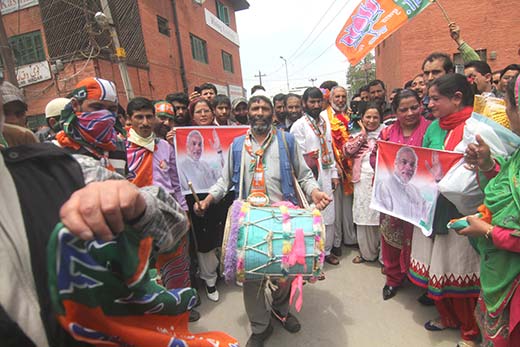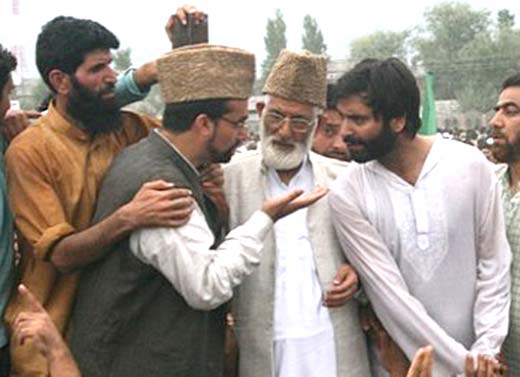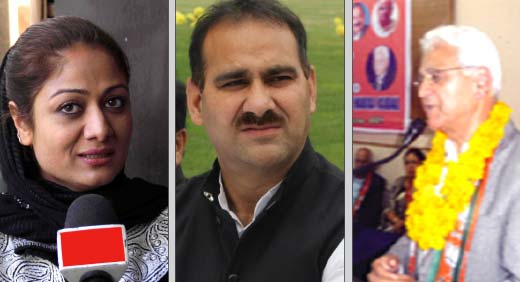Desperate to repeat Uttar Pradesh, Haryana and Maharashtra in poll-bound Muslim majority Jammu and Kashmir, BJP’s grand strategist and party president Amit Shah is apparently eyeing four assembly segments of Kashmir to materialise its “Mission 44+”. Safwat Zargar brings out the ground mood in the four pro-boycott assembly segments on BJP’s radar

Pic: Bilal Bahadur
Amit Shah has a rotund figure, but his politics is sharp. An architect of Congress’s decimation in Uttar Pradesh not so long ago, his next assignment “Mission Kashmir” is to drape Muslim majority Jammu and Kashmir in saffron.
Brewing with confidence of Modi at centre, the strategy is to retain “communally polarised” Jammu’s Hindu vote bank and target Kashmir’s boycott in its favour. Other part of the story is to rope in “influential” independent candidates from the valley to reach the state assembly.
In Kashmir, focussing on four strictly pro-boycott constituencies with a sizable migrant Pandit vote – Habba Kadal, Amira Kadal, Tral and Sopore – is just the tip of the iceberg of BJP’s strategy. Though communal at its roots, BJP’s strategy to win Kashmir is paradoxically secular with a tinge of playing up loyalties and divides of sectarian, urban/rural, gender, and even on the degree of militancy-impact.
“We will have candidates from every group and sect; Shias, Sunnis, Sikhs, Pandits, Gujjars, Paharis,” a party source said in August. Till now, four lists of candidates given mandate by party, confirms it.
“Earlier, it was Kashmir versus few Kashmiris who ruled with the help of New Delhi, indirectly. If BJP takes majority in J&K, it will be Kashmir versus India,” a close aid of a senior separatist leader, wishing anonymity, says. “It will be an open battle with no other players.”
In 2008 assembly elections, BJP had secured 11 seats in the state assembly, a stirring performance as compared to its one seat each in 1996 and 2002. More recently, it secured 30 seats out of 37 assembly seats in Jammu and three out of four in Ladakh in the recently concluded Lok Sabha polls. It failed to score a seat in valley.
As for now, everything seems to be going right for BJP. While the Mirwaiz led Hurriyat group has termed elections as “non-issue,” Geelani led Hurriyat group has already started its election boycott campaign with police cracking down on its activists. Similarly, ahead of elections, Jammu and Kashmir Liberation Front Chairman Mohammad Yasin Malik and other leaders have been put in different jails.
One of BJP’s target seats in 2014 assembly elections, Tral in south Kashmir’s Pulwama district, is a pro-freedom bastion and hot-bed of armed resistance. The assembly segment witnessed a harsh boycott after days ahead of polling on April 24, a local Sarpanch, his son and a Numberdar were killed.
“It created such scare among people that nobody ventured out of his home on polling day. Don’t ask about voting,” says Mohammad Ibrahim (name changed), a local from Tral.
Traditionally a National Conference stronghold and loyal to local independent candidate Ali Mohammad Naik thrice, during 2002 assembly elections, Tral had witnessed 11.5 per cent polling with a close tussle between NC’s Ghulam Nabi Bhat and Congress’s Surinder Singh. Bhat’s victory margin was just 309 votes. With PDP and NC head-to-head in 2008 elections, the percentage shot up to 49 per cent. The recent boycott dipped the polling percentage to less than one percent. Tral is important to BJP for two reasons; pro-boycott character and its mixed population.

Known for its diversity of different religions and schedule tribes including Muslims, Sikhs, Pandits, Gujjars and Baltis, Tral has an electorate of around 85000 votes. Predominantly a Muslim constituency, Tral has around 6000 Sikh votes and approximately 7000-8000 migrant Pandit votes. Media reports claim that number of Pandit votes registered have grown by four per cent since 2014 Lok Sabha elections. The trend is still on.
“Sikhs and migrant Pandits are BJP’s target. BJP is bringing Prakash Singh Badal from Punjab to Tral for attracting Sikh vote,” says Mohammad Ashraf Bhat, who unsuccessfully fought 2008 assembly elections on NC ticket from Tral. Ashraf, NC’s card for Tral this election, is worried about boycott as he “fears BJP sweeping a victory even without any campaign or work in the constituency”.
Ashraf is open about the “fear and pressure” of militants in Tral. “I hardly move out without consulting police about my schedule to visit an area in the constituency,” says Ashraf, whose father and two brothers have been killed by militants since 1991. “There is total disconnect between people and representatives.”
He, however, is sure that “all the Sikh and Pandit vote will not go in favour of BJP, in case of boycott. NC too has vote base in Sikh as well as Pandit community.”
70-year old, Manohar Lal (name changed), a Kashmiri Pandit from Tral, says he will not vote if his Muslim brothers boycott elections. “I can’t go against my Muslim brethrens’ aspirations,” he says.
Lal, who says he didn’t vote in the recent Lok Sabha elections, wants Kashmir dispute solved. “Till then, elections and all these developmental issues are meaningless. People here live in fear and insecurity,” says Lal, who stayed at his home in Tral during 1990s when almost everyone else was migrating.
On the other hand PDP’s Mushtaq Ahmad Shah who defeated Ashraf in 2008 assembly polls is confident of his victory. He says PDP will again sweep Tral but doesn’t deny BJP’s “polarised politics”. “Lok Sabha and assembly polls are two different things. Due to the involvement of many candidates at local level, assembly polls usually have mass involvement,” he says.
Shah, however, hints that “some agencies or party(s) might deliberately create some fear and threat among people in Tral, so as to suit their electoral ambitions”.
Sikh community in Tral living since centuries, complain that they have been ignored by all the governments in state. “For years, we have been loyal to National Conference but we haven’t seen a single gesture of betterment from them,” says Shaan Singh, a teacher and writer from Tral. “At least 98 per cent of Sikhs have decided to vote for PDP this election,” says Singh, who, according to locals is close to PDP.
On BJP’s question, Shaan Singh says, “They [BJP] are over-confident.” Sentimental vote, he continues, will be less as compared to the vote on the basis of agenda and packages.
Last week, a Sikh body, All Parties Sikh Coordination Committee (APSCC) extended their support to Peoples’ Democratic Party in elections. Interestingly, BJP’s man in Tral is a local Sikh, Avtar Singh. Locals say, Avtar Singh, a medical representative, is a novice and has less chances to attract votes locally.
The second constituency which BJP is eyeing is Hurriyat chairman Syed Ali Shah Geelani’s hometown Sopore. In the last two assembly elections, the poll percentage hasn’t crossed the figure of 20 per cent. A strong militant base where pro-Pakistan sentiments run high, Sopore might give a ray of hope to BJP’s ambitions if it strictly follows its boycott legacy. In past assembly elections, Sopore has gone to NC four times, Congress twice and Jama’at-e-Islami led by Hurriyat (G) chairman, Syed Ali Shah Geelani, thrice.
Nazir Ahmad Naikoo of Seelo village in Sopore feels whether boycott may or may not help any regional party to secure votes this election; it will surely provide an edge to BJP. Naikoo, a pharmacist businessman, is PDP’s man in Sopore.
In recent Lok Sabha polls, PDP had got 536 votes while NC followed at 262 votes in Sopore assembly segment. The total number of votes polled was 1071 out of more than 105000 votes. Sajad Gani Lone led Peoples’ Conference party candidate Salam Din Bajad ranked third with 161 votes.
Known for its apple and fruit industry, Sopore is mainly divided in two parts – Sopore town and Zainageer. While it is the township which doesn’t vote mostly, almost 30-35 villages in Zainageer belt is the focus of regional parties like NC and PDP to get vote. Both the candidates of Congress as well as National Conference live within a few kilometres in Dangerpora village. Sources say BJP is also mulling a candidate from this area.
There are total 1614 migrant voters in Sopore assembly segment. However, even if the figure looks small, Naikoo fears a harsh boycott in Sopore could lead to a “disaster.” On the other hand, he says BJP’s strategy to tackle up those constituencies who have always remained “indifferent” to elections has created a “consciousness and heart-searching” among voters.
But still the “BJP fear” has prompted Naikoo to reach out to migrants. “I talked with a lot of Pandit brothers over phone. They have assured me their vote will not go to BJP,” he says.
People in Sopore say they don’t know their MLA Mohammad Ashraf Ganie. Ganie, who won the seat in 2008 polls on NC’s ticket, hardly meets people or listens to their queries, locals say.
“People nowadays don’t vote for party but on the basis of a candidate’s character,” says Abdul Rashid Dar of Congress, who won the Sopore assembly seat in 2002. “It will take almost ten years for BJP to create a base in Sopore and that all the 1710 migrant votes (figure of migrant votes according to him) will cast votes in favour of BJP in Sopore is a daydream. 200-300 migrant votes of Sopore are in foreign countries.”

In Srinagar, BJP’s chessboard – Amira Kadal and Habba Kadal with 13302 and 3058 Pandit votes respectively – is a facade of scattered loyalties, pro-freedom identity and diversity. Both the constituencies are NC bastion. But both are known for boycott too. The constituencies didn’t cross three per cent polling percentage in 2002 assembly elections. In 2008 elections, poll percentage was below 15.
While Dr Hina Bhat, daughter of former Congress MLA, Mohd Shafi Bhat, is BJP’s Amira Kadal candidate, she expects votes primarily from people living in Amira Kadal. “I am not relying on Pandit votes,” she says.
Hina says she hasn’t met Kashmiri migrant Pandits living outside Kashmir, but she has been in constant touch with all the minorities living in the constituency.
The constituencies are almost similar in the face of challenges and issues, locals face. Being neighbouring constituencies that fall in the capital city of Srinagar, the constituencies are hub of governance setup and civil administration. The areas falling under the constituencies were among the worst hit by September 7 floods.
Winner of 2008 assembly elections from Habba Kadal, NC’s Shameema Firdous is sure of her win in the assembly seat. Her rival PDP has given mandate to veteran journalist Zafar Mehraj. On the other hand, National Youth President of Lok Jan Shakti Party (LJSP), Sanjay Saraf says Habba Kadal has been ignored by all the governments since last sixty years. Saraf, who unsuccessfully contested two assembly elections since 2002 from Habba Kadal constituency, is asking votes in lieu of development, this election. Though LJSP is an ally of BJP led NDA at centre, the party has decided to fight assembly elections separately in the state.
“Kashmiri Pandits clearly know what they want,” he says. “BJP’s wooing Pandits is not in the interest of migrants.” Besides, he continues, Pandit votes are scattered across India, and “why should Pandits fill the migrant forms that involve arduous office visits just for voting.”
During the last two assembly elections in Habba Kadal constituency, BJP’s Hira Lal Chatta has remained second in terms of votes polled. In 1996 elections, out of total 10188 votes cast, 7004 votes had been cast through postal ballot. BJP, this time, have fielded former Congress candidate and top member of Panun Kashmir, Moti Lal Kaul, from Habba Kadal.
“Anything can happen in democracy,” says Altaf Bukhari, PDP’s candidate for Amira Kadal, “because it is the voter, ultimately, who decides the success or failure of a politician.” According to Bukhari, many Pandits work as members of PDP and the party is in constant touch with those who are living in different parts of Jammu and beyond.
While saying migrant vote will not go absolutely in favour of BJP, Bukhari believes local vote, however less, will decide a winner. “I am not saying it is impossible (BJP winning Amira Kadal seat) but any party eyeing a constituency entirely on migrant votes is daydreaming,” he says.
National Conference provincial president and MLA Amira Kadal, Nasir Aslam Wani says minorities whether living within or outside the constituency are with him. “I have a good relationship with all the groups of people including Pandits, Sikhs and Muslims,” he says. “NC doesn’t ask votes on communal basis rather on the service and development to the common masses done on ground.”
Wasim Ahmad, a social science researcher from Habba Kadal, believes BJP’s rise to power will intensify political atmosphere in valley. “It is like a drowning,” he says. “At present, the situation for Kashmiris is like a man who is caught in the mire up till his neck.” Currently with a regional ruling party, he continues, only his head is out, “but if BJP wins in Kashmir, this man will get buried completely in the marsh and a lotus will grow there. And people – both pro-freedom as well as pro-India – will resist it.”















